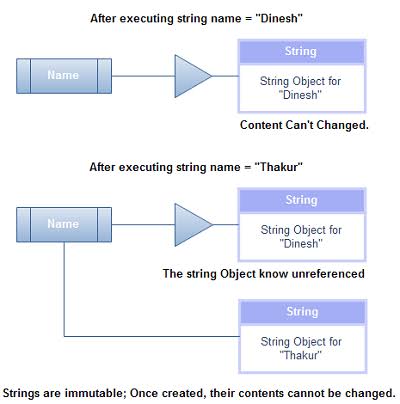Why Are Strings Immutable in Java? Essential Expertise for Designers
Why Are Strings Immutable in Java? Essential Expertise for Designers
Blog Article
What Is Unalterable Strings and Just How It Functions
In the world of programming, comprehending the concept of unalterable strings is extremely important for creating secure and durable applications. Unalterable strings describe strings that can not be changed after they are developed, guaranteeing data integrity and predictability within the code. This essential principle plays an important duty in different programs languages and uses a distinct approach to dealing with information. By exploring the intricacies of how immutable strings function, one can discover a world of benefits and opportunities that can boost the high quality and efficiency of software application growth.
The Basics of Unalterable Strings
Immutable strings, as a fundamental idea in shows, are personality series that can not be altered as soon as they are created. This implies that once a string is designated a value, that value can not be changed. In languages like Python and Java, strings are immutable items, bring about numerous ramifications in regards to memory monitoring and information honesty.
Among the vital advantages of immutable strings is that they give a feeling of safety and security in information adjustment. Since the material of an unalterable string can not be modified, it guarantees that the original data remains intact, reducing the risk of unintentional adjustments throughout program implementation (Why are strings immutable in Java?). This building also streamlines debugging processes, as designers can rely on that as soon as a string is specified, its worth will not be unintentionally changed
Additionally, unalterable strings promote reliable memory usage. When a brand-new string is developed based upon an existing one, instead of modifying the original string, the brand-new value is kept individually. This technique improves efficiency by lowering memory fragmentation and streamlining memory allocation procedures. On the whole, recognizing the fundamentals of immutable strings is essential for mastering shows ideas and enhancing code performance.
Benefits of Immutable Strings
Building upon the safety and performance benefits of unalterable strings, their advantages extend to improving code dependability and simplifying concurrent programs tasks. By being unalterable, strings can not be modified after production, which removes the risk of unplanned changes in the data they keep. This inherent immutability makes certain that as soon as a string is developed, its worth remains constant throughout the program's execution, lowering the chances of insects triggered by unexpected alterations.
Additionally, immutable strings add to code reliability by making it simpler to reason about the state of a program. Considering that strings can not be altered, designers can trust that a string will constantly hold the same value, streamlining debugging and upkeep initiatives. This predictability brings about extra reliable and secure codebases.

Implementation in Programs Languages
Within various shows languages, the consolidation of immutable strings is a fundamental element that impacts exactly how data is dealt with and controlled within code structures. The application of immutable strings differs across different programs languages, with each language supplying its own devices to go now sustain this concept.

In contrast, languages like C and C++ do not have integrated assistance for immutable strings. Programmers in these languages have to manually execute immutability by applying guidelines within their code to avoid direct modifications to string objects.
Ideal Practices for Dealing With Unalterable Strings
When dealing with unalterable strings in programs languages like Java and Python, adhering to best techniques makes certain protected and efficient data control. One of the key finest practices is to utilize StringBuilder or StringBuffer as opposed to directly adjusting strings, particularly when dealing with extensive concatenation operations. These classes provide mutable choices for string control, helping to Resources prevent unnecessary memory allowances and boosting efficiency.
Furthermore, when working with sensitive information such as passwords or API keys, it is vital to avoid keeping them as simple text in immutable strings. Making use of protected storage space mechanisms like char varieties or specialized collections for managing delicate information aids minimize safety and security threats connected with unalterable strings.
Real-world Applications and Instances
Discovering useful executions of unalterable strings in different industries discloses their substantial influence on data honesty and system dependability. In the medical care industry, unalterable strings play a crucial duty in making sure the safety and privacy of individual data. By protecting against unauthorized alterations to sensitive details such as medical documents and prescriptions, immutable strings assist keep compliance with strict privacy laws like HIPAA.
Financial organizations likewise benefit from the unalterable nature of strings to enhance the safety and security of customer information and purchase records. Unalterable strings assist prevent fraudulence and unapproved alterations to monetary info, offering a robust protection versus cyber threats and guaranteeing the depend on and self-confidence of clients.

Conclusion
Ideal techniques for working with immutable strings consist of avoiding direct alterations and making use of methods that return new string objects. Real-world applications of immutable strings include information encryption, caching, and string adjustment jobs.
Immutable strings refer to strings that can not be changed after they are produced, making sure data stability and predictability within the code. When a new string is created based on an existing one, instead than customizing the initial string, the brand-new value is stored separately.In languages like Java and Python, strings are unalterable by default, meaning that once a string object is created, its value can not be changed - Why are strings immutable in Java?. Best techniques for functioning with unalterable strings consist of preventing straight alterations and making use of approaches that return new string things. Real-world applications of unalterable strings include data encryption, caching, and string control tasks
Report this page